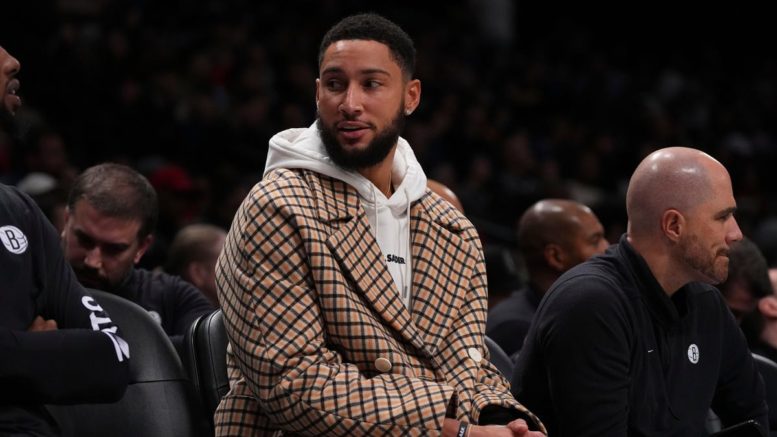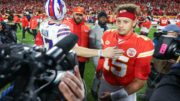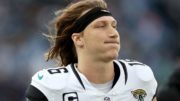Ben Simmons shows up to work, posts up on the bench in vibrant fits, shades, and quietly monitors the Nets from afar. The Nets’ well-compensated point forward has one of the best desk jobs in the NBA. Simmons being back on the shelf to rest another affliction once made him a maligned figure, but he should finally be turning the corner in the court of public opinion. For fans, that might be frustrating, but for the rank-and-file professionals who glide up and down the court every night, he’s probably never looked more like the Platonic ideal.
Simmons’ return to the Nets coincides with the NBA’s 65-game rule to combat load management being exposed as a detrimental policy for the players and the league. The NBA’s intent was to protect its product, but it also created unintended consequences. Let’s take Tyrese Haliburton returning to the Pacers after a five-game absence to nurse a groin injury. Despite being voted an All-Star starter as one of the league’s most flamboyant passers and efficient scorers responsible for revitalizing the Indiana Pacers, he may also find himself ineligible for All-NBA teams if he sits more than three games. That ultimately may cost him $40 million.
The fears that the NBA’s attendance policy would have an adverse effect on the earning potential of its marquee stars has been realized. Players’ inability to earn individual accolades because of health issues is more than just an obnoxious technicality. This is another way for players’ earnings to be capped for arbitrary reasons. The cascading effect of that 65-game eligibility rule is that Haliburton can’t be named to an All-NBA team. If Haliburton does play 65 games and earn All-NBA honors, his extension will begin at 30 percent of the salary cap instead of the 25 percent he’ll start with if he does not.
The league’s aggressive push to curtail load management has also come at the expense of forcing ailing players to make tough decisions. On Tuesday night against Golden State, Joel Embiid rushed back into the lineup after allegedly ducking Nikola Jokic in Denver for the fifth straight year. Embiid also rested during a loss to the Portland Trail Blazers, but his leg looked unreliable all night and he left after Jonathan Kuminga fell on his left leg.
Simmons’ battle against the 76ers to recoup a portion of the 2022 salary they owed him from his injury-plagued 2021-22 season was an act of preservation that should cast him in a new light, given the current climate. During that season, Simmons failed to show up for the beginning of training camp after demanding a trade before the season. After showing up for the preseason, Simmons cited his mental health as a reason for his limited team activities. For months, Simmons’ ailment was questioned. Throughout his ordeal, Simmons continued to be the butt of jokes. I should know. I cracked my fair share. Even after he was traded to the Brooklyn Nets, Simmons’ back issues continued to flare up.
He received epidural shots, then underwent an MRI which revealed his psychosomatic pain was actually a nerve impingement, missed weeks of action and was ultimately expected to suit up for Game 4 of a series against the Boston Celtics that Brooklyn would ultimately be swept in. That plan was scuttled when Simmons awoke the morning before his playoff debut complaining of back pain related to his pregame workout prior to Game 3.
Reggie Miller infamously criticized him for his lack of fire during the broadcast as the Nets were swept. Less than a year later, Kyrie Irving and Kevin Durant were traded, leaving Simmons on a Nets team that is no longer a contender. A meeting between Rich Paul and Nets officials raised the possibility that Simmons’ back injuries were the result of stress dating back to the Sixers questioning his desire to play after he vanished against the Atlanta Hawks in a second-round series loss. That’s ages ago now.
Through it all, Simmons returned to action this week, delivered a near-triple double in 18 minutes that resurrected his trade value, but hasn’t played since landing awkwardly on his left leg in the final minutes of that contest. Simmons is a volatile stock, but he has unique value when healthy, which is 50 percent of the battle.
Simmons should have a statue in the NBPA. He may never live up to his lofty promise as a former No.1 pick on the hardwood, but off of it, he’s a metonym for the physical sacrifice the NBA demands of its players. More importantly, he’s a symbol of why they should fight the NBA’s anti-load management rule.
The biggest takeaway from Simmons’ saga is that questioning player injuries is asinine. Despite that, the 65-game rule as currently implemented, is deeply flawed. There’s a middle ground for Joe Dumars and Simmons to reach. If anyone should be the champion of professional basketball’s finest off the court, it’s Simmons. Simmons should be a leading candidate next time NBPA elections swing back around.
The league even went as far as to commission a study that found data that refuted the effectiveness of load management’s usefulness in preventing injuries. However, Dr. Christina Mack, who produced the report, made sure to add that the report does not say that load management doesn’t work, either.
As my nihilistic colleague Sean Beckwith stated back in October, load management is about preserving players’ bodies and extending the duration of careers, not about keeping players healthier for game 75 in an 82-100 game (including playoffs) annual marathon. Isaiah Thomas playing through a hip injury that altered his career is a warning that players need to heed. The NBA has this all wrong, and while Embiid’s injury saga has made him the cause célèbre, Simmons has withstood the backlash against injury management for years and lived to tell the tale. If a contingent of player reps and Simmons fought this 65-game rule with the same zeal he took on the Sixers, the NBA would have to reconsider how they’ve gone about addressing the matter of long-term player health.
Follow DJ Dunson on X: @cerebralsportex
Original source here
#Ben #Simmons #hero #NBA #Players #Association #didnt #needed





